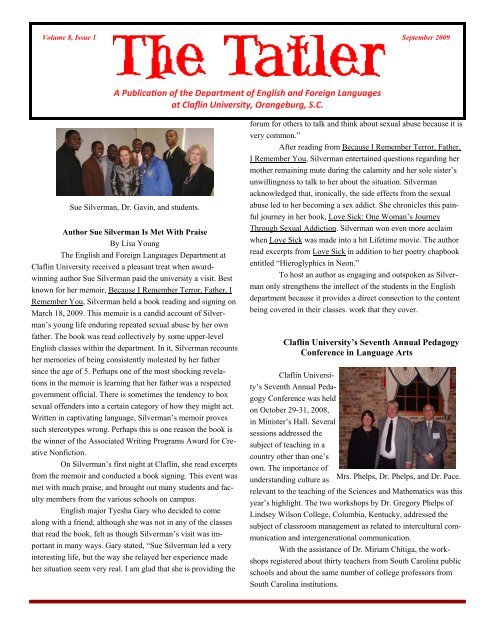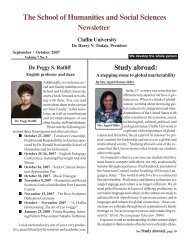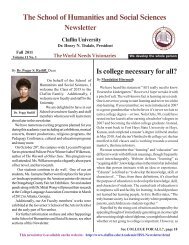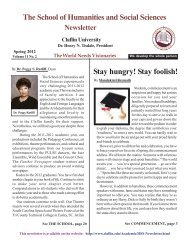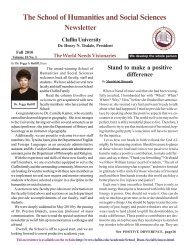The Tatler 20091for printing.pub (Read-Only) - Claflin University
The Tatler 20091for printing.pub (Read-Only) - Claflin University
The Tatler 20091for printing.pub (Read-Only) - Claflin University
Create successful ePaper yourself
Turn your PDF publications into a flip-book with our unique Google optimized e-Paper software.
Volume 8, Issue 1<br />
A Publica�on of the Department of English and Foreign Languages<br />
at <strong>Claflin</strong> <strong>University</strong>, Orangeburg, S.C.<br />
Sue Silverman, Dr. Gavin, and students.<br />
Author Sue Silverman Is Met With Praise<br />
By Lisa Young<br />
<strong>The</strong> English and Foreign Languages Department at<br />
<strong>Claflin</strong> <strong>University</strong> received a pleasant treat when awardwinning<br />
author Sue Silverman paid the university a visit. Best<br />
known for her memoir, Because I Remember Terror, Father, I<br />
Remember You, Silverman held a book reading and signing on<br />
March 18, 2009. This memoir is a candid account of Silverman’s<br />
young life enduring repeated sexual abuse by her own<br />
father. <strong>The</strong> book was read collectively by some upper-level<br />
English classes within the department. In it, Silverman recounts<br />
her memories of being consistently molested by her father<br />
since the age of 5. Perhaps one of the most shocking revelations<br />
in the memoir is learning that her father was a respected<br />
government official. <strong>The</strong>re is sometimes the tendency to box<br />
sexual offenders into a certain category of how they might act.<br />
Written in captivating language, Silverman’s memoir proves<br />
such stereotypes wrong. Perhaps this is one reason the book is<br />
the winner of the Associated Writing Programs Award for Creative<br />
Nonfiction.<br />
On Silverman’s first night at <strong>Claflin</strong>, she read excerpts<br />
from the memoir and conducted a book signing. This event was<br />
met with much praise, and brought out many students and faculty<br />
members from the various schools on campus.<br />
English major Tyesha Gary who decided to come<br />
along with a friend, although she was not in any of the classes<br />
that read the book, felt as though Silverman’s visit was important<br />
in many ways. Gary stated, “Sue Silverman led a very<br />
interesting life, but the way she relayed her experience made<br />
her situation seem very real. I am glad that she is providing the<br />
September 2009<br />
forum for others to talk and think about sexual abuse because it is<br />
very common.”<br />
After reading from Because I Remember Terror, Father,<br />
I Remember You, Silverman entertained questions regarding her<br />
mother remaining mute during the calamity and her sole sister’s<br />
unwillingness to talk to her about the situation. Silverman<br />
acknowledged that, ironically, the side effects from the sexual<br />
abuse led to her becoming a sex addict. She chronicles this painful<br />
journey in her book, Love Sick: One Woman’s Journey<br />
Through Sexual Addiction. Silverman won even more acclaim<br />
when Love Sick was made into a hit Lifetime movie. <strong>The</strong> author<br />
read excerpts from Love Sick in addition to her poetry chapbook<br />
entitled “Hieroglyphics in Neon.”<br />
To host an author as engaging and outspoken as Silverman<br />
only strengthens the intellect of the students in the English<br />
department because it provides a direct connection to the content<br />
being covered in their classes. work that they cover.<br />
<strong>Claflin</strong> <strong>University</strong>’s Seventh Annual Pedagogy<br />
Conference in Language Arts<br />
<strong>Claflin</strong> <strong>University</strong>’s<br />
Seventh Annual Pedagogy<br />
Conference was held<br />
on October 29-31, 2008,<br />
in Minister’s Hall. Several<br />
sessions addressed the<br />
subject of teaching in a<br />
country other than one’s<br />
own. <strong>The</strong> importance of<br />
understanding culture as<br />
Mrs. Phelps, Dr. Phelps, and Dr. Pace.<br />
relevant to the teaching of the Sciences and Mathematics was this<br />
year’s highlight. <strong>The</strong> two workshops by Dr. Gregory Phelps of<br />
Lindsey Wilson College, Columbia, Kentucky, addressed the<br />
subject of classroom management as related to intercultural communication<br />
and intergenerational communication.<br />
With the assistance of Dr. Miriam Chitiga, the workshops<br />
registered about thirty teachers from South Carolina <strong>pub</strong>lic<br />
schools and about the same number of college professors from<br />
South Carolina institutions.
Sigma Tau Delta, Spring 2009 Induction<br />
By Jasmine McClenton<br />
Sigma Tau Delta International English Honor Society<br />
was founded in 1924 at Dakota Wesleyan <strong>University</strong><br />
in Mitchell, South Dakota. Since its establishment the organization<br />
has strived to fulfill the central purpose of bestowing<br />
honor upon students and professors in the discipline<br />
of English Language and Literature. <strong>The</strong> society currently<br />
has over 750 active chapters throughout the United<br />
States, the Caribbean, and Europe (www.english.org).<br />
To add to the nearly 8,500 members that are inducted<br />
into Sigma Tau Delta each year, the Alpha Iota<br />
Zeta chapter of <strong>Claflin</strong> <strong>University</strong> proudly announced its<br />
seven new initiates on April 27, 2009. In the presence of<br />
four of <strong>Claflin</strong>’s most esteemed English professors, Department<br />
Chair Dr. Ronnie Hopkins, Dr. Mitali Wong, Dr.<br />
Sharynn Etheridge-Logan, and Ms. Linda Hill, three of<br />
them members of Sigma Tau Delta themselves, a promising<br />
addition was made to the small chapter.<br />
Since its last induction, under the leadership of<br />
chapter president Shellisa Coates and academic advisor<br />
Dr. Etheridge, the society has been successful in various<br />
undertakings including a campus-wide book drive. With<br />
the incorporation of its newest members, Diana Bloome,<br />
Vanessa Thomas, Lisa Young, Kiara Drummond, Erin<br />
Swinney, Kiara Drake, and Elizabeth Shaw, the chapter<br />
has arranged to fill next year with an array of showcases<br />
for the talent and dedication that emanates from the students<br />
and faculty of <strong>Claflin</strong> <strong>University</strong>’s Department of<br />
English and Foreign Languages. With sights set on achieving<br />
greater campus presence and furthering the universal<br />
goals of Sigma Tau Delta, Alpha Iota Zeta remains true to<br />
the principles of sincerity, truth, and design.<br />
Sigma Tau Delta inductees, members, and advisor.<br />
Page 2<br />
Law School Admission<br />
By Antoine Marshall<br />
<strong>The</strong> Law School Admissions Test, better known as<br />
the LSAT, is a five part exam that law schools use to gauge<br />
an applicant’s credentials for law school. Administered only<br />
4 times a year, the test consists of two logical reasoning<br />
sections, a logic games section, reading comprehension<br />
section, a writing section, and an experimental section. <strong>The</strong><br />
exam only uses the logical reasoning, logic games, and<br />
reading comprehension sections for scoring, and range<br />
from 120 to a perfect score of 180. Each question answered<br />
correctly counts as a point toward your raw score, which<br />
determines your scale score. Many highly qualified students<br />
with high GPAs miss out on the school of their choice<br />
because of this complex test.<br />
In my opinion, the most important section for test<br />
takers to study for and do well on is the logical reasoning<br />
question, simply because of the fact that it constitutes almost<br />
half of your scaled score. Logical reasoning questions<br />
state an argument, and depending on the question, ask you<br />
to reinforce the argument, weaken the argument, what can<br />
be assumed from the argument, or explain a discrepancy<br />
from the argument. Most mistakes in this section come<br />
from not reading carefully and assuming that things are true<br />
that the question does not mention.<br />
<strong>Read</strong>ing comprehension is the section that most test<br />
takers are most familiar with. If you took state exams<br />
through elementary and high school, the SAT, or ACT then<br />
you are familiar with reading comprehension. In this section<br />
a passage or essay is given, followed by a series of<br />
questions to see if you can comprehend the material.<br />
Studying the logic games section is probably the<br />
most awkward section for test-takers. It is awkward, because<br />
most students have never faced questions of this<br />
style. But its awkwardness allows for rapid improvement<br />
during studying, and out of all sections, it is easiest to raise<br />
your logic games score.<br />
With the writing section at the end, the test lasts for<br />
a whopping five hours on average. And if you didn’t think<br />
the test wasn’t difficult enough due to its format, the test<br />
creators make it even more difficult by adding a strict time<br />
limit, and a non-scored test section. For each section you<br />
have 35 minutes to answer 24-30 questions, and even the<br />
fastest test takers have trouble finishing each section. <strong>The</strong><br />
sample section is sure to be within the first three sections<br />
that you take, but test makers have become masters of hid-
ing it. To all prospective law school students, it’s best to<br />
do as well as you can on all sections, and not even try to<br />
figure out which section is the un-scored sample section.<br />
Studying for this behemoth of a test is a chore for<br />
most. Because of the amount of study time required for a<br />
decent score, many students opt to take the test in July or<br />
October, giving them the summer to study for it. This<br />
also allows for early score reporting, so that applications<br />
can be sent to schools in a timely manner. Some students<br />
spend thousands for a Kaplan or Powerscore class in order<br />
to prepare.<br />
Being a late decider that I would attend Law<br />
School I didn’t take my first exam until December, taking<br />
only Thanksgiving break to study for it (which in itself is<br />
difficult when you’re spending time with family). After<br />
not getting the score I was shooting for, I took the exam<br />
again in February, using Winter Break to study. If you<br />
are interested in law school, I advise that you take the<br />
July or October exam, both for the benefits a summer<br />
break of studying will give you, as well as you can send<br />
out your applications earlier (early applications will be<br />
dealt with in another article). If you have the money to<br />
spend on a training course, I would recommend Powerscore.<br />
After taking a free sample course under both<br />
Kaplan and Powerscore, I found that Powerscore gave<br />
better insight, and provided a better setting for learning<br />
the test. If you don’t have the money, then you can use<br />
my test studying strategy; buying sample tests and taking<br />
as many tests as you can to get familiar with tests got me<br />
used to the grueling length of the test. Hopefully this article<br />
help you secure your perfect 180, and into your dream<br />
school.<br />
Newsletter Staff<br />
Editor<br />
Patrice Cooper<br />
Staff<br />
Lisa Young<br />
Jasmine McClenton<br />
Antoine Marshall<br />
Kiara Drake<br />
Elizabeth Shaw<br />
Tyesha Gary<br />
Faculty Advisors<br />
Dr. Mitali Wong<br />
Ms. Sharon Gile<br />
Page 3<br />
Have You Considered Studying Abroad??<br />
By Tyesha Gary<br />
In the fall semester of 2008, I studied abroad in<br />
London, England. It was the most exhilarating experience<br />
of my life. As an English major, I took advantage of the<br />
opportunity to see Shakespeare plays at the Globe, and of<br />
course I visited Buckingham Palace, <strong>The</strong> Eye, <strong>The</strong> London<br />
Bridge, Big Ben, Hyde Park, and so many other historical<br />
landmarks and architectural designs. In Paris, I toured the<br />
Louvre Museum, the Notre Dame Gothic Cathedral, and<br />
the marvelous Eiffel Tower, just to name a few.<br />
Though the experience was an invaluable one, preparing<br />
to study abroad was no easy task. For any prospective<br />
study abroad students, I would suggest a couple of<br />
things. First, if you plan to study abroad during the academic<br />
school year, you should make sure that transferable classes<br />
are available so that you will gain course credit (you<br />
want to make sure that it will not interrupt your projected<br />
graduation date). Secondly, speak with both your academic<br />
advisor and study abroad advisor, as<br />
they should be able to guide you in<br />
the right direction as inform you of<br />
the legitimate study abroad agencies.<br />
Dr. Donald Pace is now the study<br />
abroad advisor on our campus. Most<br />
importantly, you need to make sure<br />
that you will have enough funds to<br />
finance your semester (or year)<br />
abroad. <strong>Claflin</strong> will pay up to the “Big Ben”<br />
amount that you are awarded for tuition, room, and board,<br />
here, but if the abroad fees exceed what you are awarded, it<br />
is your responsibility to pay the balance using either a<br />
scholarship, loans, personal savings, or a combination.<br />
Once you have done the above, you should be well<br />
on your way to experience a world outside of your own,<br />
experience multiculturalism at its best, and ultimately<br />
achieve personal growth, make new friends, build professional<br />
relationships, and take home a genuine appreciation<br />
for various people’s ways of life.
Interview with Dr. Juan Carlos Hernandez-<br />
Cuevas<br />
By Kiara Drake<br />
With thirty years of teaching experience,<br />
Dr. Juan Carlos Hernandez- Cuevas is one of the Department<br />
of English and Foreign Language’s newest faculty members.<br />
Born in Mexico City, Mexico, Dr. Hernandez earned his<br />
teaching degree in Elementary Education from La Escuela<br />
Nacional de Maestros (<strong>The</strong> National School of Teachers) in Mexico<br />
City. He received his B.A. in Arts and Letters and minored in<br />
Black Studies at Portland State <strong>University</strong> in Oregon. Dr. Hernandez<br />
later earned a M.A. in Latin American and Spanish Literature<br />
from the same institution. He received of his Ph.D. in Spanish<br />
American Literature cum laude at the <strong>University</strong> of Alicante<br />
in Valencia, Spain. Though responsible for educating and enlightening<br />
students today, Dr. Hernandez spent over eight years as a<br />
scholar. To those who tire of eight o’clock classes, oral presentations,<br />
and term papers he often says, “If I can do it, you can do<br />
it.”<br />
Dr. Hernandez obtained a reverence for knowledge from<br />
his mother. She recommended various literary works to her children<br />
early in their lives and encouraged them to spend time perusing<br />
the library shelves. Dr. Hernandez’s appetite for education<br />
was whetted further during visits to his mother’s classrooms. She<br />
taught at the middle and high school level and taught at the collegiate<br />
level later in her career. Ultimately, her ability to access her<br />
students’ imaginations and curiosity inspired her son to become<br />
an educator.<br />
Dr. Hernandez embarked upon his teaching career in<br />
Mexico, but continued teaching Spanish language, literature, and<br />
culture in the United States. He realized that Spanish would one<br />
day make its way into mainstream American society. “In 1980, I<br />
realized that Hispanic culture would have an impact in the postmodern<br />
world,” he said. Dr. Hernandez wanted to be a facilitator<br />
of this advancement. One of his greatest challenges in the classroom<br />
is illustrating the uniqueness of various Latin cultures. He<br />
seeks to provide his students with a global perspective, reaching<br />
beyond their limited perceptions of the world.<br />
Over the years, Dr. Hernandez never questioned his calling<br />
to teach despite the racism and discrimination he endured<br />
while a student in both America and Canada. He found that gaining<br />
respect required more effort than his White counterparts had<br />
to produce. Often, he was overlooked and excluded from campus<br />
activities. <strong>The</strong>rfore, <strong>Claflin</strong>’s familial environment has greatly<br />
appealed to him. Here, he has seen the willingness of professors<br />
to aid students in their progress; <strong>Claflin</strong> is more aligned with his<br />
desire to directly impact individual students.<br />
When asked what he sees himself doing in ten years, Dr.<br />
Hernandez replied that he will be writing and doing literary research.<br />
An avid writer, he has <strong>pub</strong>lished many works.<br />
Page 4<br />
Interview with Ms. Annette Grevious<br />
By Elizabeth Shaw<br />
Ms. Annette Grevious, an honorable<br />
member of the <strong>Claflin</strong> faculty, is<br />
passionate about the performing arts. Her happiness is<br />
found within theatre and encouraging art education. Certainly<br />
much interest has developed around this accomplished<br />
woman, in a field once dominated by men, as she<br />
has been a Helen Hayes Award Nominee, which is an aspired<br />
position for many performers.<br />
Her first realization of having a passion for the<br />
performing arts was when she was 8 years old. She and her<br />
grandfather performed a 30-minute complete improvisation<br />
in her mother’s living room. She found interest in taking on<br />
personas other than her own. As she acted as different people<br />
in a completely different place for those thirty minutes,<br />
realizing that she really enjoyed fantasy, pretending, and<br />
having the opportunity to become someone else.<br />
She is the alumni of several prestigious institutions;<br />
as she received an associate’s degree in Speech and<br />
Drama from Gainesville College in Gainesville, GA, a<br />
Bachelor of Arts degree in <strong>The</strong>atre from Brenau <strong>University</strong><br />
in Gainesville, GA, and a Master of Arts in <strong>The</strong>atre Performance<br />
from the <strong>University</strong> of Louisville. She added,<br />
“Gainesville College and Brenau <strong>University</strong> had a joint<br />
theatre program, which operated under Gainesville <strong>The</strong>atre<br />
Alliance”.<br />
Because she is an accomplished faculty member of<br />
<strong>Claflin</strong> <strong>University</strong>, it was only right to discuss her transition<br />
from the stage to the classroom. When asked about her<br />
other profession, Grevious exclaims that she wanted to<br />
teach since she was a young child. She found herself always<br />
respectfully imitating her teachers. She began her<br />
teaching route at a young age as she would teach her Barbie<br />
dolls lessons, develop assignments for them, and even grade<br />
them. She developed leadership skills early on, due to her<br />
persistence to act as the teacher, when playing “school”<br />
with neighborhood friends. Soon after which, she utilized<br />
the concept of combining both of her passions, by “teaching<br />
theater”. In fact, she predicts that even if she made it “big”,<br />
she would still want to teach.<br />
<strong>The</strong> Helen Hayes nomination was for Outstanding<br />
Ensemble, and Ms. Grevious has been admired for a show<br />
she performed in, in Washington, DC, Intimate Apparel.<br />
Although the cast was really small, of about six actors, it<br />
was a very strong production. Not only was this the act of<br />
the performers, Grevious quickly compliments, “the awesome<br />
script”. With only a short rehearsal period of two<br />
weeks, the six member group dynamically flourished during<br />
this stressful period, and they managed to develop a nice<br />
bond and strong show. Ms. Annette Grevious is not only an<br />
attribute to educating others, but also to the field of<br />
performing arts.


